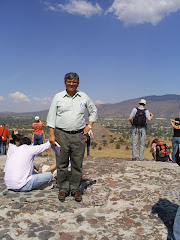
Estimados:
La saga continua. Este interesante artículo publicado en el periódico The Guardian de Inglaterra responde a la pataleta de la Soil Association con buenos argumentos y pone las cosas en su sitio. El último párrafo es muy ilustrativo y algo a tener muy en cuenta. Es muy educativo leer como va desmenuzando los argumentos de la SA.
Lo que si llama la atencion es el silencio de los corderos que tenemos en la prensa peruana acerca de este estudio encargado por el gobierno inglés. Da envidia ver como los columnistas de varios de los principales periódicos británicos se enfrascan en un debate de altura con la Soil Association. Ejemplarmente no le dan ningún margen a la demagogia y de manera consistente en los últimos 3 días han tratado de enfrentar esta controversia desde el lado de la ciencia y la razón -como debe ser.
De vuelta al Perú, podríamos preguntarnos a qué se debe el silencio?, Quien sabe. El ambientalismo cuasi religioso y el sentimiento "feel-good" en contra de las "grandes corporaciones" parece que ha permeado en gran parte de nuestra prensa y medios en general. Es que en una sola olla se han mezclado ambientalistas, activistas de ONG's a tiempo completo y columnistas políticamente correctos. No existe NINGUN formador de opinión capaz de ponerle el cascabel al gato. Ni siquiera por curiosidad se atreven a leer y enterarse si este debate tiene algo de mérito y si las consecuencias económicas nos alcanzarán de alguna manera.
Recuerden que se afirma que somos "líderes" en la exportación de cultivos orgánicos, cuando nuestra producción orgánica no llega ni siquiera al 0.01% de la producción mundial de alimentos y se dice que tenemos grandes posibilidades de inundar el mercado europeo con nuestros cultivos orgánicos.
Creemos que este estudio del gobierno inglés será el punto de quiebre para la megaindustria orgánica inglesa. En estos dias de crisis y cuando muchos hombres de a pie tienen que escoger entre llenar el tanque de sus autos, pagar la hipoteca de su casa o pagar 3 veces por una lechuga o un tomate orgánico -comparado con un convencional - las cosas se pueden poner negras para la aún poderosa Soil Association.
Termino con esta pregunta, ¿comparten nuestros hombres y mujeres de prensa la misma curiosidad que los ingleses? ¿Uds qué dicen?
Saludos
Luis Destefano Beltrán, Ph.D.
Argument is about capitalism, not food
Ben Goldacre, The Guardian, Saturday 1 August 2009
This week the Food Standards Agency published a review paper showing that organic food is no better than normal food, in terms of composition, or health benefits. The Soil Association's response has been swift, and received prominent and blanket right of reply: this is testament to the lobbying power of this £2bn industry, and the cultural values of people who work in the media.
I don't care about organic food. I am interested in bad arguments. Theirs has three components. Firstly, they say that the important issue with organic food is not personal health benefits, but rather benefit to the environment. This is a popular strategy from losing positions: "Don't talk about that, talk about this."
Secondly, they say that there are positive health benefits of organic food, but they are related to the absence of pesticides, and cannot be measured by the evidence that has been identified and summarised in the FSA paper. This, again, is gamesmanship. Either you are proposing that there are health benefits which cannot ever be measured. In this case you have faith, which is not a matter of evidence. Or you are proposing that there are health benefits which could be measured, but have not been yet. In this case, again, you have faith rather than evidence, but you could at least start recruiting researchers now, using your £2bn, to investigate your beliefs with fair tests.
And thirdly, sadly, like many industries in a corner, the Soil Association seeks to undermine the public's understanding of what a "systematic review" is, which itself causes collateral damage to everybody's ability to engage in debates on evidence. They say that the report has deliberately excluded evidence to produce the answer that organic food is no better.
The accusation is one of "cherry-picking", and it is hard to see how it can be valid in the kind of study conducted by the FSA, because in a "systematic review", before you begin collecting papers, you specify how you will search for evidence, what databases you will use, what types of studies you will use, how you will grade the quality of the evidence (to see if it was a "fair test"), and so on.
What is it that the FSA ignored which so angered the Soil Association? As an example, from their press release, they are "disappointed that the FSA failed to include the results of a major European Union-funded study involving 31 research and university institutes and the publication, so far, of more than 100 scientific papers, at a cost of €18m, which ended in April this year". They gave the link to qlif.org.
I followed this link and found the list of 120 papers. Almost all are irrelevant. The first 14 are on "consumer expectations and attitudes", which are correctly not included in a systematic review of the evidence on food composition. Then there are 22 on "effects of production methods": here you might expect to find more relevant research, but no. The first paper ("The effect of medium term feeding with organic, low input and conventional diet on selected immune parameters in rat"), while interesting, will plainly not be relevant to a systematic review on nutrient content. The same is true of the next paper, "Salmonella infection level in Danish indoor and outdoor pig production systems measured by antibodies in meat juice and fecal shedding on-farm and at slaughter": it is not relevant. Furthermore, the overwhelming majority of these are unpublished conference papers, and some of them are just a description of the fact that somebody made an oral presentation at a meeting. The systematic review correctly looked only at good-quality data published in peer-reviewed academic journals. This raises the issue of transparency: we want the methods and results of scientific research to be formally presented, and accessible by all.
If a government report on anything relies substantially on unpublished and inaccessible research then we are correctly concerned: in fact, I raised such concerns, two weeks ago, because the key piece of evidence presented by the Home Office to justify retaining DNA from innocent people who have been arrested was an incompetently presented piece of unpublished and incomplete research.
In reality, this is not about organic food. The emotive commentary in favour of organic farming bundles together diverse and legitimate concerns about unchecked capitalism in our food supply: battery farming, corruptible regulators, or reckless destruction of the environment, where the producer's costs do not reflect the true full costs of their activities to society, to name just a few. Each of these problems deserves individual attention. But just as we do not solve the problems of deceitfulness in the pharmaceutical industry by buying homeopathic sugar pills, so we may not resolve the undoubted problems of unchecked capitalism in industrial food production by giving money to the £2bn industry represented by the Soil Association.













1 comentario:
Me parece interesante el artículo porque va en contra de lo que muchos daban por asumido (que los alimentos orgánicos eran más caros pero en contrapartida daban mayor calidad de vida<)
Publicar un comentario